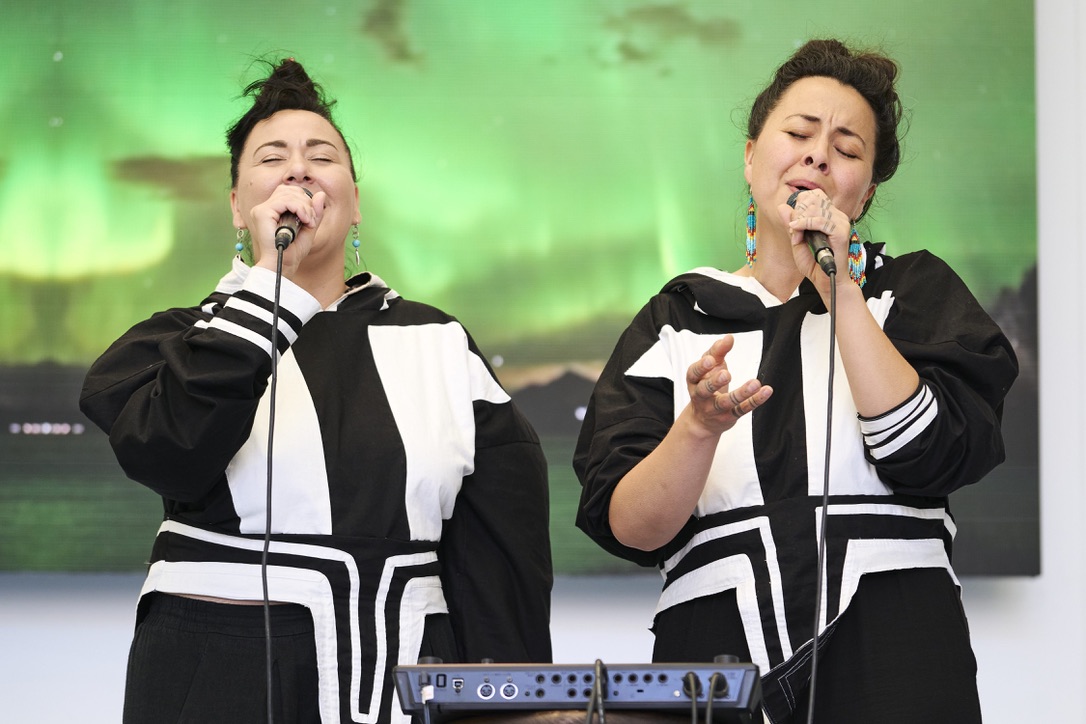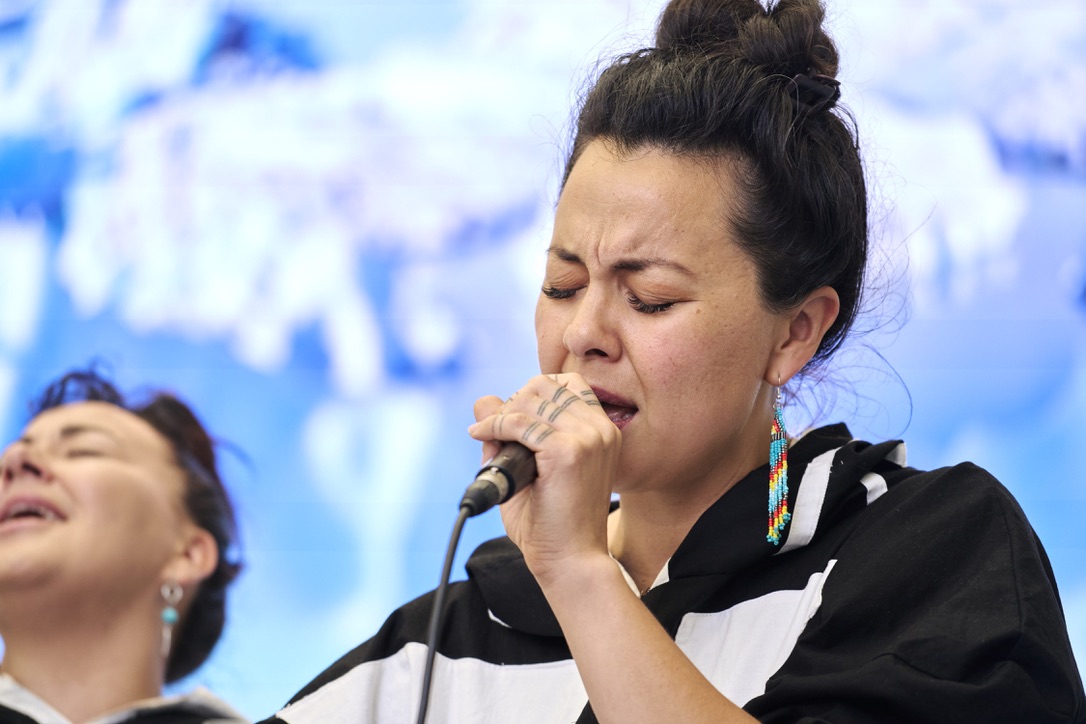By Poppy Philbrook
Expo Reporter
OSAKA, Japan — At an event many regard as a sort of cultural Olympics, Inuit throat-singing sister duo Tiffay Ayalik and Inuksuk Mackay had the added thrill of sharing their art with an audience that had never heard anything like it before.
“It’s so cool to bring something as unique and specific as throat singing to a place where maybe nobody has heard anything remotely close to that,” Ayalik said in an interview before her second Expo performance alongside Mackay.
“We get to come in and share something accurate, authentic, celebratory, and to have that be somebody’s first insight into our culture is a huge honour.”
The duo, known as PIQSIQ, had an Expo run from June 17 to June 21, culminating on National Indigenous Peoples Day. The Expo gig came nearly a month after the release of their third studio album, Legends, on May 30.
Alongside the pair’s shows as PIQSIQ, the sisters joined forces with Mackay’s family for demonstrations of Inuit games and storytelling throughout the week.
Mackay and Ayalik agreed that the fact the audience had virtually no frame of reference for Inuit culture gave them more autonomy over how to share their traditions.
“We’re not confronting the stereotypes. We’re not confronting weird kinds of things that we do in Canada with religious hangover, or Indian Act hangover, that kind of stuff,” said Ayalik, speaking to the detrimental impacts of Canadian colonialism on Inuit communities and traditions.
“We can help nip exoticism in the bud before it gets them because they’re seeing something from us, by us.”
Sitting front row for PIQSIQ’s June 19 performance alongside two of her friends was elderly Osaka resident and Expo attendee, Kiyoko Ito. Despite considering herself well-travelled, having been to China, South Korea, and even Toronto, Canada, PIQSIQ’s performance took Ito by surprise.
“I’ve been to all sorts of places. But when I heard what they sang today, I thought it was amazing,” Ito admitted with a smile.
“We have all sorts of music in Japan, but nothing like this,” she added, going on to express her respect for PIQSIQ and how difficult katajjaq seems, especially in the sweltering heat of Japan’s summer.

Ayalik and Mackay have been throat singing for as long as they can remember, both in its art and game forms.
Growing up in Yellowknife, Northwest Territories, the sister duo would throat sing while out on the land with their family to pass the time.
Ayalik and Mackay went on to join forces with Ojibwe-Métis singer and guitarist, G.R. Gritt, to form Quantum Tangle in 2014. The group would win a Juno Award in 2017 for Indigenous Music Album of the Year for their album Tiny Hands.
In 2019, Ayalik and Mackay released their first EP as PIQSIQ, Altering the Timeline, laying the foundation of their unique sound and work to come. Combining traditional songs with modern looping and mixing techniques, PIQSIQ’s sound takes the well-established game and art of Inuit throat singing, or ᑲᑕᔾᔭᖅ (katajjaq), into unexpectedly eerie soundscapes.
The most recent addition to their discography, Legends, expands PIQSIQ’s well-established style with the addition of the Inuit drum, or ᕿᓚᐅᑦ (qilaut), which was featured in their music for the first time on Legends.
Like katajjaq itself, PIQSIQ’s live shows are improvised – from the songs they sing to the impact the environment they’re performing in has on their bodies, no two performances will ever sound the exact same.
PIQSIQ’s week-long stint at Expo saw them take to stages beyond the Canada Pavilion, turning the heads of countless passersby.

“I definitely saw some wide eyes in a couple of places where we had our first show because we were in a stage area, but then also getting a lot of passerby traffic being like, ‘Whoa, what is this?” Ayalik recalled, labelling these interactions as one of the beauties of cultural exchange.
“A general openness to listen and to share, that is all that’s required to be at a place like Expo,” she continued.
Mackay added to Ayalik’s comment, saying, “I feel like when you get into your everyday life, it’s pretty hard to surprise you. It’s fun to be able to do something that maybe is just so outside of what someone might expect.”
According to Mackay, the Arctic already draws in a lot of Japanese tourists.
“They’re quite enthusiastic about the Aurora, about the culture, and dog teams–it feels pretty cool to be able to take a little of that from where we come from, here,” Mackay said.
But for many, PIQSIQ included, making the trip up North is costly.
“I think our favourite opportunities to perform are in Nunavut because it’s rare,” Mackay said, adding that it’s more expensive to travel domestically to Nunavut and neighbouring regions than it is to make the trip across the Pacific to Japan.
“I’m glad we were able to bring that here for the people who can’t make it over.”




